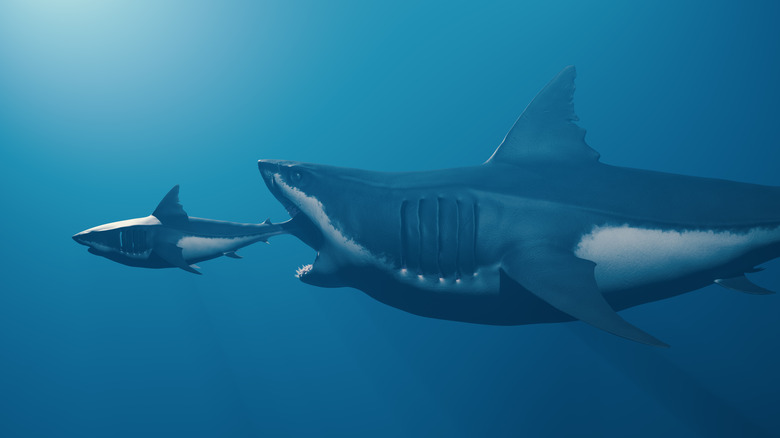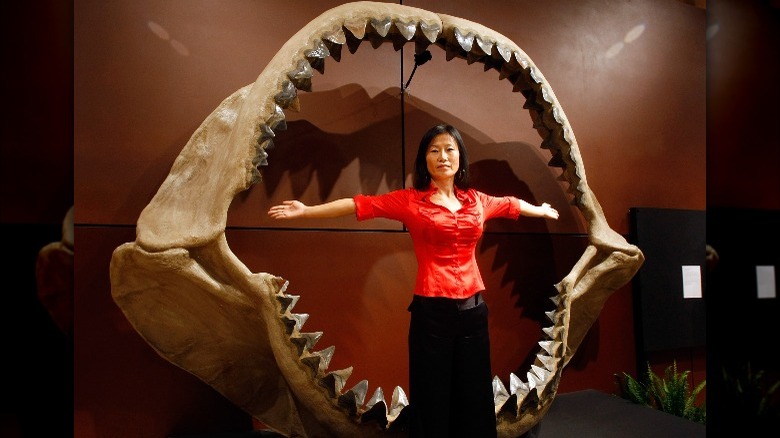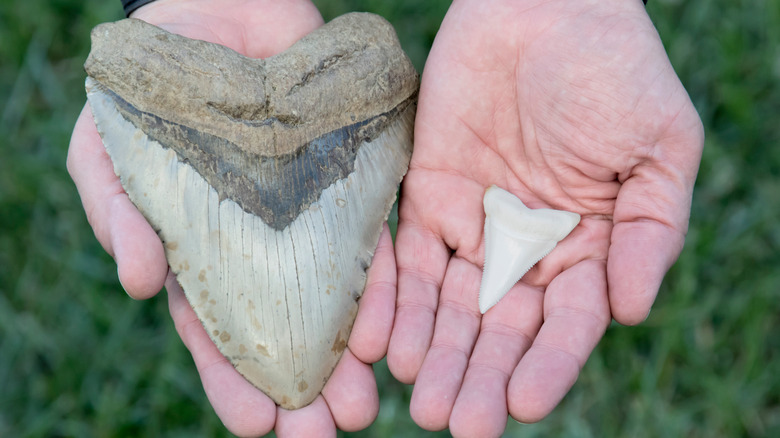Why The Megalodon Has Earned The Title Of 'Hyper Apex Predator'
Whenever someone mentions sharks, the now extinct megalodon shark seems to somehow enter the conversation. This mysterious, gigantic shark has been a topic of conversation since the species was given its name in 1835, and for good reason (via Britannica). According to Fossilera, the megalodon grew up to 60 feet in length and could weigh up to 70 tons. This was much larger than the modern day great white sharks, which tend to stay around 20 feet long.
It turns out the megalodon's size wasn't just for show. Instead, researchers believe that the megalodon may have been a type of "hyper apex predator," hunting down and eating other apex predators, according to Science News. If true, this would place the megalodon so high up the food chain that no other animal would have been able to stop it. As paleontologist Dana Ehret jokes, "What did megalodon eat? ... Well, whatever it wanted" (via Discovery).
The megalodon was an opportunistic hunter
During its time on Earth, the megalodon was an opportunistic hunter. According to the Ecological Society of America, an opportunistic hunter can change hunting strategies depending on what types of prey are available, allowing them to have greater success finding food. This also means that the megalodon would've had a varied diet, eating anything that swam in its presence.
Research published in Science Advances found that the megalodon diet was more varied than previously thought. Researchers used chemicals found in fossilized megalodon teeth compared to other marine animals to determine the type of diet this ancient predator may have had. When looking at the chemical composition in the teeth, they found more nitrogen than any other marine animal they studied. This deeply puzzled the researchers, who wondered what could be in the megalodon diet that was so different from other animals. According to Robert Boessenecker, a paleontologist at the College of Charleston, "there's just nothing else in the ocean today that has nitrogen isotopes that are that concentrated" (via Discovery).
Despite being a hyper apex predator, the Megalodon still went extinct
If there is nothing in today's ocean that could explain the levels of nitrogen found in megalodon teeth, what did it eat instead? There are several theories that have attempted to explain this. Since it is believed that the megalodon was a hyper apex predator, the list of marine animals they could have eaten is quite long. According to Science News, the megalodon could have even been cannibalistic, eating younger and smaller members of its own species.
If the megalodon was really above everything else on the food chain, how did it go extinct? Researchers may have the answer to that, too. According to The Conversation, the megalodon may have simply lost out on food opportunities due to the great white shark, which would have likely eaten the same prey. If the great white shark was able to outhunt the megalodon, despite its smaller size, there wouldn't have been enough food left for the much larger megalodon, which would've had greater caloric requirements in order to survive, let alone thrive.
Whatever the reason, those of us who are scared of what lurks beneath the oceans may be glad to know that the megalodon is no longer around. At least, as far as we know.


